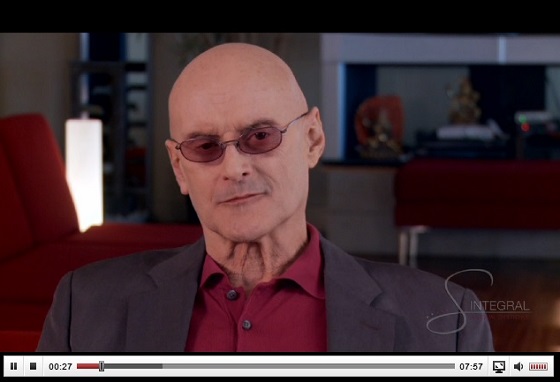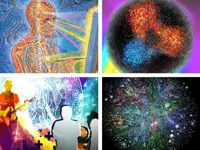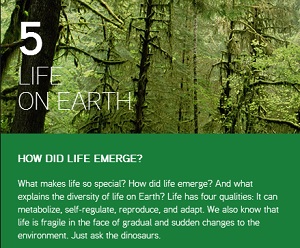TRANSLATE THIS ARTICLE
Integral World: Exploring Theories of Everything
An independent forum for a critical discussion of the integral philosophy of Ken Wilber
SEE MORE ESSAYS WRITTEN BY FRANK VISSER
Eloquent Emptiness
The Philosophy of WOW! and
The End of Science
Frank Visser
Most integral communications are inspirational, motivational or transformational, rather than informational, or fact- and truth-oriented.
In a recent Integral Life email communication (May 27, 2014) the keynote presentation by Ken Wilber at the 2012 Integral Spiritual Experience "Kosmic Creativity" conference was reposted under the wide ranging title "How to Manifest a Universe". The accompanying introductory text reads:
Ken Wilber explains how we can connect with the creative spark at the core of every moment, and how we can harness that creativity to manifest our unique vision and purpose.
The introduction (written by Corey de Vos) continues:
There is an inherent creative spark at the core of each and every moment, within every single drop of experience you've ever had. That is, every moment has an element of karma (including the patterns of the previous moment, so that the manifest world continues to exist) and an element of creativity (transcending the patterns of the previous moment, so that something new can come into being). Which means that creativity is itself inextricably woven into the fabric of the universe—in fact, one useful definition of "spirituality" might simply be the ability to recognize and participate with the creative openings and opportunity of every passing moment.
Most integral communications are inspirational, motivational or transformational, rather than informational, or fact- and truth-oriented. This one is no exception. But truth is not what we like to be true. Or what sounds true. Truth is what turns out to be true—if we like it or not. And that's a big difference, in mind set, attitude and culture when it comes to acquiring and communicating knowledge. Religious people want to prove that something is true, scientists want to find out if something is true—and if not, they move on in their continuous exploration.
By proclaiming each and everyone of us to be creative—even every single moment of our lives, and even the cosmos at large—the whole concept gets diluted to a meaningless phrase. It's like saying: intelligence is everywhere, everyone of us has it—well, to some degree at least. It's precisely the exceptional examples of creativity and intelligence that fascinate us and demand admiration. Not every stone is a gem. (And yes, every stone is beautiful in itself, if you have eyes to see, but we're not talking that kind of poetry here).
At the same time the concept of creativity is mystified to cosmic proportions. For if our own creativity can be linked to, and is directly caused by, the creativity behind the whole cosmos, the message becomes essentially religious, dangerously close to creationism, or should we say "creativism"?[1] As I wrote in a previous essay on this topic, "It is fine to promote creativity and individual freedom, but please leave cosmic creativity or cosmic evolution out of it."[2]
Why? Read on...
KEN WILBER'S CREATIVE COSMOLOGY
Wilber's keynote address, which can be viewed in full only by members of Integral Life, covers over two hours (and is divided into: Introduction, Creativity and Spirituality, The Architecture of Creativity, and The Practice of Creativity). In these videos, he links personal creativity to the creativity which is supposedly inherent in biological and cosmological evolution. This is part of the "evolutionary spirituality" concept which has been promoted by Wilber and others of late. Let's take this wider view and see how valid it is.
 Ken Wilber delivers his key note address on Kosmic Creativity
Ken Wilber delivers his key note address on Kosmic Creativity
Confining ourselves to the free Introduction video, we hear Wilber say the following things:
The existence of evolution is doubted by few modern thinkers. What is not as obvious, or agreed upon, is the actual mechanism by which this rather miraculous evolution occurs. Fewer and fewer researchers believe that the standard neo-Darwinian explanation of chance mutations and natural selection are enough to provide a believable account. There is just too much novelty, creativity, and non-random elements in evolution, to pass it all off as chance.
Rather, more and more thinkers, are coming to believe, that some sort of fundamental creativity is built into the very fabric of the cosmos itself. From quarks, to atoms, to molecules, to living cells, to plants, to animals and human beings, each step more complex and more conscious, is just too much to pass off on randomness. In fact, the major transformations in evolution are just the opposite of randomness. They are astonishingly novel, beautifully innovative, and miraculously creative. They do not show the universe randomly winding down, they show it creatively winding up!
They all show what Whitehead called the "creative advance into novelty". What he felt was a fundamental and built-in aspect of the universe itself. And that means, built into you, and me, as well. And the deepest core of each and all of us is a fundamental drive to creativity. A creativity that is a basic drive to evolution itself....
As more and more thinkers also are coming to believe, this fundamental creativity is actually an aspect of Spirit itself. And evolution is actually Spirit-in-action. It is Spirit's fundamental creativity, bringing into being more and more new types of events, and happenings, and beings themselves. And seen in this way, evolution is the product of evolution's ongoing creativity.
Suddenly that remarkable unfolding—from quarks, to atoms, to molecules, to plants, to animals, to you and me—starts to make sense! It is Spirit-in-action!
Note his frequent use of words like "miraculous", "astonishing", his reduction of the scientific view to a merely chance-based philosophy, and his vague references to "few thinkers" or "more and more thinkers" that supposedly support his rather idiosyncratic view of evolution. Note also how Wilber fails to make the distinction between the cosmic and the local levels: we are local islands of complexity in a sea of cosmic entropy (i.e. cooling down). In fact, we owe our complexity to this entropy! It's the gradient between hot stars and cool space which makes life possible in the first place. It is not a simple matter of "the universe" going this way or that. We should not project on the universe what may be true for ourselves. [3]
Wilber's disdain for mainstream or "reductionistic" science is well known. As he phrased it in his magnum opus Sex, Ecology, Spirituality (1995), it amounts to a "philosophy of oops!":
The universe just occurs, there is nothing behind it, it's all ultimately accidental or random, it just is, it just happens—oops! The philosophy of oops, no matter how sophisticated and adult it may on occasion appear—its modern names and numbers are legion, from positivism to scientific materialism, from linguistic analysis to historical materialism, from naturalism to empiricism—always comes down to the same basic answer, namely, "Don't ask." (p. 3)
What Ken Wilber fails to see, or fails to mention, is that science deals not only with chance, but with "chance and necessity" or "chance and natural selection" (where Wilber's dichotomy would rather be "karma and creativity", for lawfulness and novelty). When it comes to a true confrontation of insights from these two worlds of science and spirituality, Wilber often resorts to a caricature of science to promote what I would like to call now his own "philosophy of WOW!"—mirroring his disdain, so as to make it explicit.[4]
By over-emphasizing the wonders of nature—and no scientist would deny these—Wilber prepares the readers to accept his spiritual interpretation of biological and even cosmological evolution. But introducing the concept of Spirit to clarify the manifold fields covered by the sciences would effectively be the end of science.
THE BIG HISTORY PROJECT
“We, as complex creatures, desperately need to know this story of how the universe creates complexity, despite the Second Law.”
—David Christian
Covering the same vast territory, but in a vastly more scientific spirit, the Big History Project, set up by David Christian (and sponsored by Bill Gates), communicates the findings of science when it comes to the origin of matter, life, mind and culture. It is instructive to compare the intellectual atmosphere of Integral Theory and these Big Historians.[5] It is important to note that the field of Big History is heavily oriented towards science (cosmology, astronomy, geology, chemistry, biology) even if it includes human cultural history.
David Christian, a historian and scholar of Russian history, is credited with coming up with the term "Big History", in an attempt to integrate all available scientific knowledge in a format that can be taught in classrooms and universities. He currently is President of the Big History Association. Big Historians (such as David Christian, Eric Chaisson, Fred Spier and others) slice up cosmic history in slightly (though roughly equivalent) different epochs. (For a general overview see the Wikipedia page on Big History). This is Christian's version of the major cosmic "threshold" events:
 Source: www.bighistoryproject.com
Source: www.bighistoryproject.com
For those in a hurry, here's an instructive TED lecture in which Christian covers this whole field of the 13.7 billion year history of the universe in less than 18 minutes. (For the number freaks, this is over 12 million years per second. The lecture has been viewed close to 4.000.000 times):
David Christian delivers his TED lecture "The History of the World in 18 Minutes"
Full transcript and related information can be found here.
Christian starts with the crucial question: "How does the universe create complexity given the law of entropy?" He answers, with great understatement, "with great difficulty". And with each new stage of cosmic evolution, "the going gets tougher". At no point does Christian feel the need to resort to a metaphysical, transcendental or spiritual "explanation" to account for these natural phenomena.
Remember, the Second Law of Thermodynamics states that entropy (or disorder) will increase over time. Stated differently, nature strives to reach balance or equilibrium. At the same time, in this state of equlibrium, nothing of value would be possible. It is called heat death. It is because we, in our solar system, are out-of-equlibrium, and continuously receive energy supplies from the Sun, that evolution towards complexity is possible.
Typical for a scientific approach is that Christian, when confronted with something apparently mysterious—where did life come from?, how did the elements get formed?, how did stars form in the early universe?—asks for the conditions that were needed to makes these things possible. For example, for life to become possible you need a huge supply of simple atoms (Carbon, Oxygen, Nitrogen etc.), a liquid environment, and energy—not too much and not too little (these are called the Goldilocks conditions). These conditions prevailed on the early Earth.
Similarly, we might not yet know why and how the Big Bang happened, but from the split second of this singular event onwards, we pretty much know the details. We do know, for example that the expansion of the universe resulted in its cooling, and this, in turn, made neutral atoms possible, and allowed light photons to escape. Gravity, in turn, caused clusters of simple matter to arise, which resulted in galaxies, stars and planets. And so on. Each step is studied carefully, so apparent mystery can be replaced by solid science. How would Wilber explain all these phenomena other than by "Spirit did it"?
Also, Christian goes on, each new stage in the cosmic process results in entities that are more vulnerable and fragile. So there's an ethical component to this story told by Big History: higher complexity is not more robust and invulnerable—on the contrary, one big comet could wipe out all complex life—but just the opposite. "We, as complex creatures, desperately need to know this story of how the universe creates complexity, despite the Second Law", says Christian. "And why complexity means vulnerability and fragility".
So different from the "quantum physics proves we are all one" or "the new biology says we should cooperate" approaches of Laszlo and the Conscious Evolutionists! We are already—by definition—the most social and communicative species on Earth, in all of evolutionary history.
What strikes me as a major difference between Big History and Integral Theory, is that instead of mystification ("Spirit creates every novelty") it is bent on clarification of the many wonders we see around is. For sure, the feeling of wonder, so characteristic of scientists, is not absent here. As Christian phrases it in his TED lecture:
"Each stage is magical, because it creates the impression of something utterly new, almost out of nowhere..."
But—and this is a Big But—he doesn't stay there. Each stage of cosmic evolution is dealt with in a determined attempt to unravel what is actually going on in the cosmos. So different from Wilber's "Spirit did it"-approach! When it comes to scientific credibility, Wilber's musings amount to eloquent emptiness.
I keep asking this question: does the integral community care about scientific credibility or is it content to be an inspirational community?[6]
NOTES
[1] Visser, F. (2011), Ken Wilber's "Creativism": God and the New Biology, www.integralworld.net
[2] Visser, F., (2011), Heavy Elements: Why Integral Physics is Lost in Space, www.integralworld.net
[3] Visser, F., (2012), Integral Inflation: And Some Sobering Comments, www.integralworld.net
[4] Visser, F., (2013), My Tribute to Ken Wilber: Anatomy of a Love-Hate Relationship, www.integralworld.net
[5] Visser, F., (2013), Integral Theory and the Big History Approach: A Comparative introduction, www.integralworld.net
[6] Visser, F., (2014), Wilber or Truth?: How to Get Rid of Your Wilber Complex, www.integralworld.net
|

 Frank Visser, graduated as a psychologist of culture and religion, founded IntegralWorld in 1997. He worked as production manager for various publishing houses and as service manager for various internet companies and lives in Amsterdam. Books: Ken Wilber: Thought as Passion (SUNY, 2003), and The Corona Conspiracy: Combatting Disinformation about the Coronavirus (Kindle, 2020).
Frank Visser, graduated as a psychologist of culture and religion, founded IntegralWorld in 1997. He worked as production manager for various publishing houses and as service manager for various internet companies and lives in Amsterdam. Books: Ken Wilber: Thought as Passion (SUNY, 2003), and The Corona Conspiracy: Combatting Disinformation about the Coronavirus (Kindle, 2020). 



